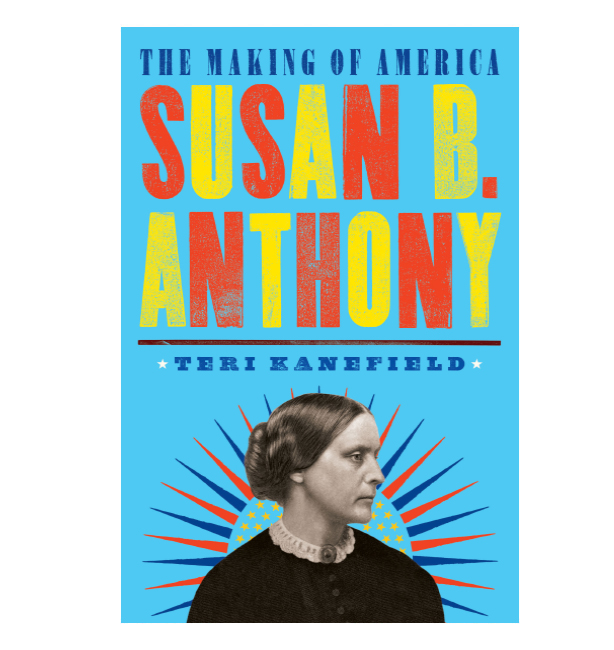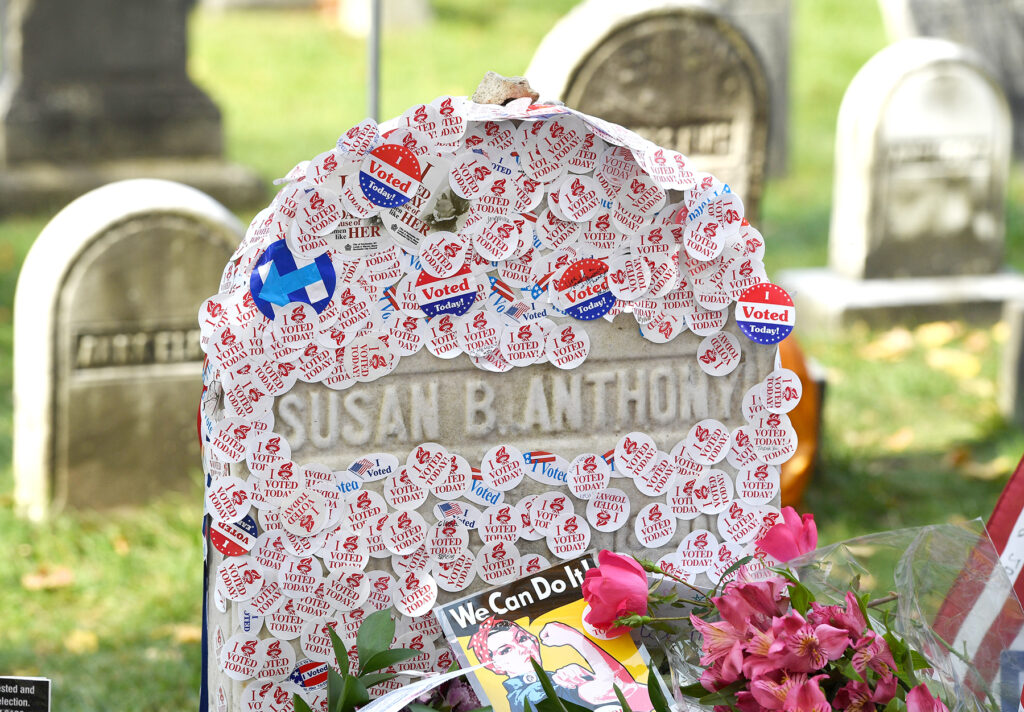This blog post started out as a 10 minute video. What follows is an edited transcript. You can see the video here.
Before I talk about Susan B. Anthony, I want to talk a little about reactionary (or regressive) v. progressive politics. Make America Great Again is an expression of reactionary politics. Reactionaries seek to return back to a bygone era. They feel a “forceful desire” to return to the [mythic] past. Conservatives want to maintain the status quo, and liberals are more forward-looking.
I’ve talked about the two views of American history: Progressive try to push us forward, reactionaries try to push us back. There have always been reactionaries and always will be. There have always been people who resist a racially diverse democracy. There always will be. The danger isn’t going away.
Last summer and fall there was a lot of doomsaying and despair mongering with a lot of what-ifs. What if Trump loses the election but keeps himself in power. The doomsaying is back and despair is back. My followers on Twitter ask me things like, “Why does it feel like the Democrats keep losing? We have the White House, the House, and a split Senate, but we keep getting handed losses.
Perhaps the problem is how people are defining a “win.” There seems to be a sense that if X happens, democracy will win and fascism will lose and the game will be over.
Here’s the thing: The game is never over. There is always another inning. The anti-democratic forces will always come back swinging. If you doubt that, see this blog post on the Authoritarian Dynamic and Authoritarian Personality.
What do we do? We learn lessons from the heroes of the past. I feel qualified to talk about Susan B. Anthony because I wrote a book about her.
Susan B. Anthony was born in 1820 into a Quaker family. She always embraced Quakerism and its ideals. Quakers held the belief (considered radical at the time) that all people are equal. One scholar, Kathleen Berry, describes Susan B. Anthony as a “radical egalitarian,” which explains her life choices, even those choices that got her into trouble.
Quaker egalitarian ideas got them into trouble in England because they didn’t accept the hierarchy of king and aristocracy. In the United States, Quakers were among the early abolitionists. The Anthony home was a popular meeting place for local abolitionists. Frederick Douglass was a frequent visitor. (I threw that in because later they had a falling out over whether women should be included in the Fifteenth Amendment, the Amendment that gave Black Men the right to vote after the Civil War. Susan B. Anthony was enraged that women were not included as well and refused to support the amendment. Not that, as a woman, she had any power or her word carried any weight at all, but she was outspoken and said it should include women. As a radical egalitarian, she couldn’t abide by anything that put one group over another group (in this case, all women).
Anyway, Quakers educated their daughters because they also believed women were equal to men. B. Anthony became a teacher, one of the professions open to women who could read.
At the age of 28, she left teaching to help her parents establish their farm. When the farm was established, her parents supported her work as a political activist. (The word then was “reformer.” That’s what they called themselves, that’s what she called herself.)
She spent the decade before the Civil War dedicated to women’s causes and the abolitionist cause. In 1856 she became an agent for the American Anti-Slavery Society. She drew a small salary that covered her travel expenses as she toured around and gave lectures, speaking against the evils of slavery. At the time, this was dangerous. She had things thrown at her. I think it can be fairly said that she risked her life.
She also developed a lifelong partnership and friendship with Elizabeth Cady Stanton, who was also dedicated to both women’s rights and abolitionism.
Let’s back up and talk about the situation for women in the nineteenth century.
A woman had no identity separate from her husband. The legal term was coverture. Wife-beating was legal. Divorce wasn’t an option. A woman couldn’t own property or enter contracts. A man had to speak for her. Any money a woman earned belonged to her husband. A woman was considered incompetent to testify in court. This is partly why she couldn’t get divorced or assert any rights. A few low paid professions—like factory or domestic work—were open to her, and teaching for women who could read. A man, on just his word, could have his wife committed to an asylum. Women who were “difficult “and refused to be subservient often found themselves locked in asylums.
If you haven’t thought about this, pause here and imagine what life was like for a white women. It was obviously even worse for Black women. Even after the Civil War, the rape of a Black woman was not recognized as a crime.
Susan B. Anthony never got married. When asked who she never married, she said it was because a woman in a marriage was not equal to her husband under the law, and she couldn’t abide any social situation where people are not equal. She phrased it this way: “Woman’s sustenance is in the hands of men, and arbitrarily and unjustly he exercises his power over her.”
Remember, at the time the Republican Party was the more liberal party. After the Republicans in Congress passed the Fifteenth Amendment, giving the vote to black men, the situation looked pretty hopeless for the cause of women’s equality. The Fourteen Amendment Section II, also one of the Civil War amendments, specified that women were not counted. It included the word “male.”

Susan B. Anthony and Elizabeth Cade Stanton understood that, just after the Civil War during this brief window, the Republicans had the power to push Amendments through. It was a narrow window when the constitution could be easily amended by the more liberal party.
But the men refused to include women.
When the text of the Amendments was being debated, Stanton said, “If that word ‘male’ be inserted in the Constitution, it will take us at least 100 years to get it out.” To say that Susan B. Anthony and Elizabeth Cady Stanton felt betrayed by the men who they had been working alongside would be an understatement.
It’s fashionable right now on social media to say things like this:
What does that even mean? Chileans ousted Pinochet using democratic means. What if, after Pinochet seized power, Chileans had said, “Looks like it’s too late. So let’s spread defeatism, because that’s so helpful.”
Imagine how Susan B. Anthony felt when women were left out of the Fourteenth and Fifteenth Amendments. Imagine how they felt knowing it might be a hundred years before the damage could be undone.
What did they do? They got to work.
The women reformers split into two groups. The more radical group was led by Susan B. Anthony and Elizabeth Cady Stanton. They took up for poor female factory workers. They worked on changing laws that kept women legally inferior to men. As before, Susan B. Anthony traveled and lectured. She knocked on doors and tried to talk to women about their rights. Many told her they had all the rights they wanted; they didn’t want equal rights and slammed doors in her face.
In her words, she’d “embarked on an unpopular case and must be content to row upstream.”
How did she keep going? She told herself she was working, not for her contemporaries, many of whom would never appreciate her work, but for “future generations we must labor.”
Occasionally, after making progress (like getting the NY law changed so women could own property) another group of lawmakers would undo their progress and they’d have to start over.
By the end of Susan B.’s long life, she did see some progress. In some places, women in abusive marriages could obtain divorces. Women were entering colleges. There was a nationwide (and international) women’s organization fighting for suffrage.
Susan B. Anthony did not live to see the passage of the 19th Amendment, which gave the vote to women. As an elderly woman, she wrote this: “Oh, if I could live another century and see the fruition of all the work for women!”
I guess mortality means none of us ever really get to know how the story ends.
When Susan B. Anthony became elderly, she trained young women in the organization to take over the work after her death. She called them her nieces. They called her Aunt Susan. She died in 1906 and the 19th Amendment giving women the right to vote passed in 1920. I included this image in my book. After voting for Hillary Clinton in 2016, women flocked to Susan B. Anthony’s grave to pay their respects:
I’ve argued that MAGA means “Take America Back to the days of robber barons & white male supremacy.”
The question I get is: “What if they succeed in rolling us backwards.” The answer is: We need to do the work of rolling everything forward again. Progressives push forward. Regressives push back. Sometimes other progressives splinter, which makes things harder. The right wing tends to stay in formation.
Will the right wing extremists win? That depends on two things. (1) How do you define “win” ? Because there will always be people who reject democracy, securing democracy is a constant battle. (2) And it depends on whether people are willing to stay engaged and do the work.
Political Scientist Daniel Ziblatt, coauthor of How Democracies Die, said “Democracy requires constant mending”
He also said that “Protecting voting rights is hard, grinding work. It may even take more than one election cycle. It may take a decade.” That’s because there’ve always been (and probably always will be) anti-democratic forces trying to break down democracy.
Continuing the work is up to us.
(The sources for this blog post are in the bibliography of my Susan B. Anthony bibliography. To see it, click here.)









